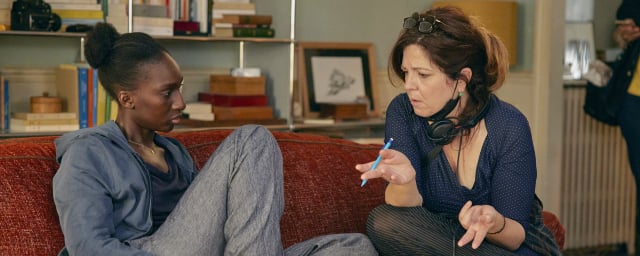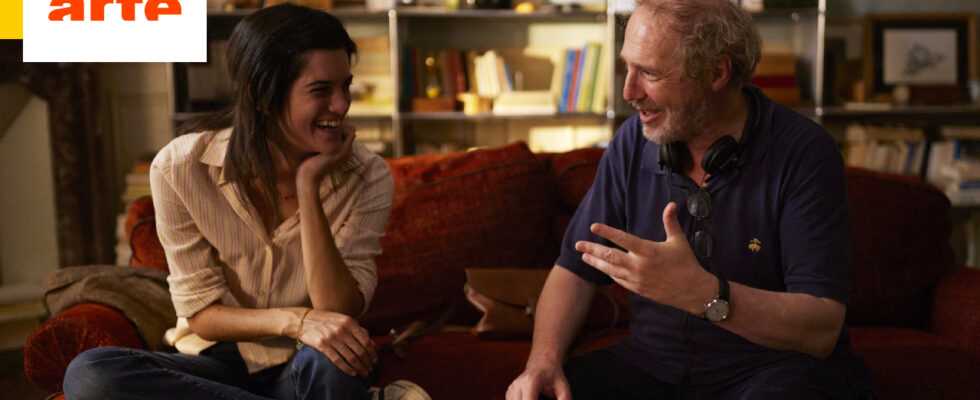New screenwriters, new performers but also new directors: the series by Olivier Nakache and Eric Toledano has had a facelift for this second season. Meeting with the filmmakers who took up the challenge of directing the 35 episodes.
In the new season of In Therapy broadcast every Thursday evening since April 7 on Arte, the psychiatrist Philippe Dayan (Frédéric Pierrot) receives a new patient every day of the week, and each session in his office is equivalent to an episode. To take charge of the staging of these 35 (!) new episodes, Eric Toledano and Olivier Nakache called on 4 new directors to succeed Mathieu Vadepied, Pierre Salvadori and Nicolas Pariser: Agnès Jaoui (Place publique), Emmanuel Finkiel (The Pain), Arnaud Desplechin (Deception) and Emmanuelle Bercot (In his lifetime).
Jacques Weber, who plays Alain, Dayan’s “patient number 4”, was directed by the latter for his episodes. He knew the director as a distant admirer, as an actress and director, and dreaded their meeting. “I told myself that she was going to take me for a theatrical“, he laughs.
He then describes a real professional thunderbolt. “Things happened most naturally in the world, smoothly, without shyness, as if it were obvious (…) It happened to me to have the sensation of being in front of a real psychoanalyst, and that can only be done if there is a strong text and a sufficiently modest, elegant and sensitive director who accompanies you.“
He describes a frank and direct director, with whom we do not get along. “During filming, painful moments happened to me in my life, and [Emmanuelle] showed an elegance, a modesty… She didn’t try to comfort me. It’s terrible, people who lick you like affectionate dogs. I remember a moment when, sensing that I was not well before turning, she just pressed her hand on my thigh saying to me: “here we go, are you ready? Engine.” It was very important for me.”
Jacques Weber and Emmanuelle Bercot
“I feel like a bit of a lame duck on this adventure“, confides the director of La Tête haute and La Fille de Brest, who had never worked before on a screenplay that she had not written and knew nothing about psychoanalysis.In my own feature films, if I have a scene of two people sitting and talking, it’s just a nightmare for me, I don’t know what to do with it!” she laughs.
Having a lot of affection for Eric Toledano and Olivier Nakache, the director declares that she would probably not have joined the adventure if the proposal had not come from them, she who is used to deciding everything on her shootings. “I then hung up on the question that had been asked of them: pwhy call on me, Emmanuel, Arnaud and Agnès? What could we bring to a concept that was already strong enough and didn’t need us?” she asks.
“i was iworried about not being able to invent much in terms of directing because that’s what amuses me when I make films, and they told me that they were thinking of us for the direction of actors. That was the main issue of their proposal, and we were like guests in the living room.“
It was then necessary to find the actor that she would like to film, with whom she would like to spend time. “I don’t really care about the character, what interests me is the person I’m filming. You have to be able to bring the character to the person I’m filming, rather than the other way around, and that I want to tell things about this person rather than about the character.“
A practice which she describes as extremely difficult, and a tour de force for the actors. “In the cinema, they never have to do this length of text. It is a work that is very similar to that of the theatre. With Jacques, we did rehearsals as we would have done for the theatre, setting things up very precisely before shooting. In the end, we are at the service of a project that is stronger than us.“
The actress underlines the passion of the director from the theater like her for the direction of actors, and her empirical experience of the problems and “knots“in which comedians sometimes find themselves.”She was really close to me, sometimes sitting beside me while it was spinning. we could even shake hands“, she recalls, laughing. “I was really comfortable in her gaze, she managed to get into my head.“

Eye Haidara and Agnes Jaoui
Arnaud Desplechin was responsible for the episodes with young Lydia, played by Suzanne Lindon. “I was upset in relation to the attacks in the first season. As for psychoanalysis, the subject of the series, I told myself that I couldn’t miss that, nor miss Nakache and Toledano, it was out of the question. I knew I wanted to learn with these two men.” Chance of life, the director had never worked with Frédéric Pierrot. “I couldn’t miss such an actor and this collaboration.“
For the role of Lydia, the director and the two showrunners see many actresses during the casting, but the choice of Suzanne seems obvious. “In Lydia’s story, there is something that will touch on melodrama, on the question of tears. I was thinking of Japanese filmmakers like Mizoguchi or Naruse, telling myself that it was something that could help me draw this relationship between the analyst and his patient, which escapes a relationship of seduction, a paternal relationship, and which perhaps comes closer to a relationship of friendship.“
“Watching Arnaud directing the actors taught me a lot about my way of acting and about what a director specifically expects from someone, but also about his way of letting himself be carried away with his actor,” the actress points out. “I feel like he didn’t have a clear perspective on my character’s therapy, and I think we figured out how to go to therapy together. It was extremely liberating for me to see that there was no right or wrong answer, just a direction that we took together with Frédéric Pierrot.“
“The range of what we were able to meet as directors, to see this level of requirement, of cinephilia, of exchange that we were able to have with each of the directors is an incredible luxury for us“, concludes Eric Toledano.
